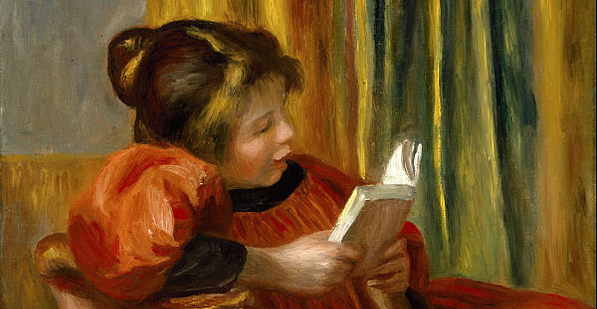Two sisters sit at home, talking. The younger sister does needlework and arranges flowers picked from the garden, as she passes the time until her boyfriend comes to visit.
The older sister, on the other hand, is trying to make some kind of sense out of her wasted life, having an emotional crisis brought on by yesterday’s reading of the Iliad.
“Old Homer leaves a sting,” she complains.
“Sweet, tell me what is Homer’s sting, Old Homer’s sting?” teases the younger sister.
The older sister replies:
He stirs my sluggish pulse like wine,
He melts me like the wind of spice,
Strong as strong Ajax’ red right hand,
And grand like Juno’s eyes.
Yes, the older sister speaks similes and comparisons in a beautifully-rhymed iambic tetrameter. They both do. Did I mention this was all in a poem?
The poem is “The Lowest Room,” by Christina Rossetti (1830-1894).
It’s a conversation-poem in which the sisters come to terms with their own lives, by comparing them to the lives of the Homeric heroes of the Iliad. Those warriors of the battlefield of Troy seemed so vibrantly alive:
‘Then men were men of might and right,
Sheer might, at least, and weighty swords;
Then men in open blood and fire
Bore witness to their words,‘Crest-rearing kings with whistling spears;
But if these shivered up in the shock
They wrenched up hundred-rooted trees,
Or hurled the effacing rock.
Not only did they whack each other with trees and boulders, their emotional lives were so much more solid and developed:
‘Calm in the utmost stress of doom,
Devout toward adverse powers above,
They hated with intenser hate
And loved with fuller love.
The golden age of Homeric man was so great that it throws our own times into deep shadow. Coming from a reading of “the acts of Hector and each clangorous king,” a modern can only say “A shame it is, our aimless life,” and wish to be a stable-keeping servant in Homeric times rather than a free citizen in this shadowy age.
But the younger sister (six years younger) disagrees. She thinks life is obviously better now than then. “To me our days seem pleasant days, our home a heaven of pure content.” They go back and forth for a while about which of the ages is gold, and which dross.
But the most important thing, says the younger sister, is that Homer’s men were pagan polytheists, and his characters lacked the knowledge of the true God:
‘Homer, tho’ greater than his gods,
With rough-hewn virtues was sufficed
And rough-hewn men: but what are such
To us who learn of Christ?’
It’s a Sunday School answer; she has played the Jesus trump card. The older sister (always the sharper intellect of the two, always the leader in conversation) hits back hard. The Jesus card is a cheap way to avoid the burning truth of life’s disappointment, sis. The older sister, not without some bitterness, points out that she is in good company when she says she feels the cold breath of meaninglessness. If she asks “What is life, that we should live,” well, so did the wisest man in the Bible: “Vanity of vanities.” Homer understood this same truth of Ecclesiastes perfectly:
This Homer felt, who gave his men
With glory but a transient state:
His very Jove could not reverse
Irrevocable fate.Uncertain all their lot save this–
Who wins must lose, who lives must die:
All trodden out into the dark
Alike, all vanity.
“One is here,” murmurs the younger sister, “Yea, greater than Solomon.”
That pretty much ends the conversation. The younger sister moves on to her flower-arranging, and soon her boyfriend arrives. She’s deeply in love with the boy.
Twenty years later, she is married to the young man, and has a little girl who looks a lot like her. “She, loved and loving long ago, Is loved and loving yet.”
What has happened to the the older sister, though, is exactly what she thought would happen, exactly what she was trying to talk to her prettier, livelier, taller, more feminine little sister about:
While I? I sat alone and watched;
My lot in life, to live alone
In mine own world of interests,
Much felt, but little shown.Not to be first: how hard to learn
That lifelong lesson of the past;
Line graven on line and stroke on stroke:
But, thank God, learned at last.So now in patience I possess
My soul year after tedious year,
Content to take the lowest place,
The place assigned me here.
“Old Homer leaves a sting.”
There are lots of reasons to read Christina Rossetti, but here’s one of them: She knew how to read Homer. She brought to the Iliad everything she had and everything she was — her broad education, her Victorian womanhood, her vast potentials and her searing limitations. But above all, she brought to the reading of Homer her deep faith in Christ. She did not cheaply deploy the Jesus trump card, but she certainly knew where her help came from and when the true Golden Age was:
Yet sometimes, when I feel my strength
Most weak, and life most burdensome,
I lift mine eyes up to the hills
From whence my help shall come:Yea, sometimes still I lift my heart
To the Archangelic trumpet-burst,
When all deep secrets shall be shown,
And many last be first.
